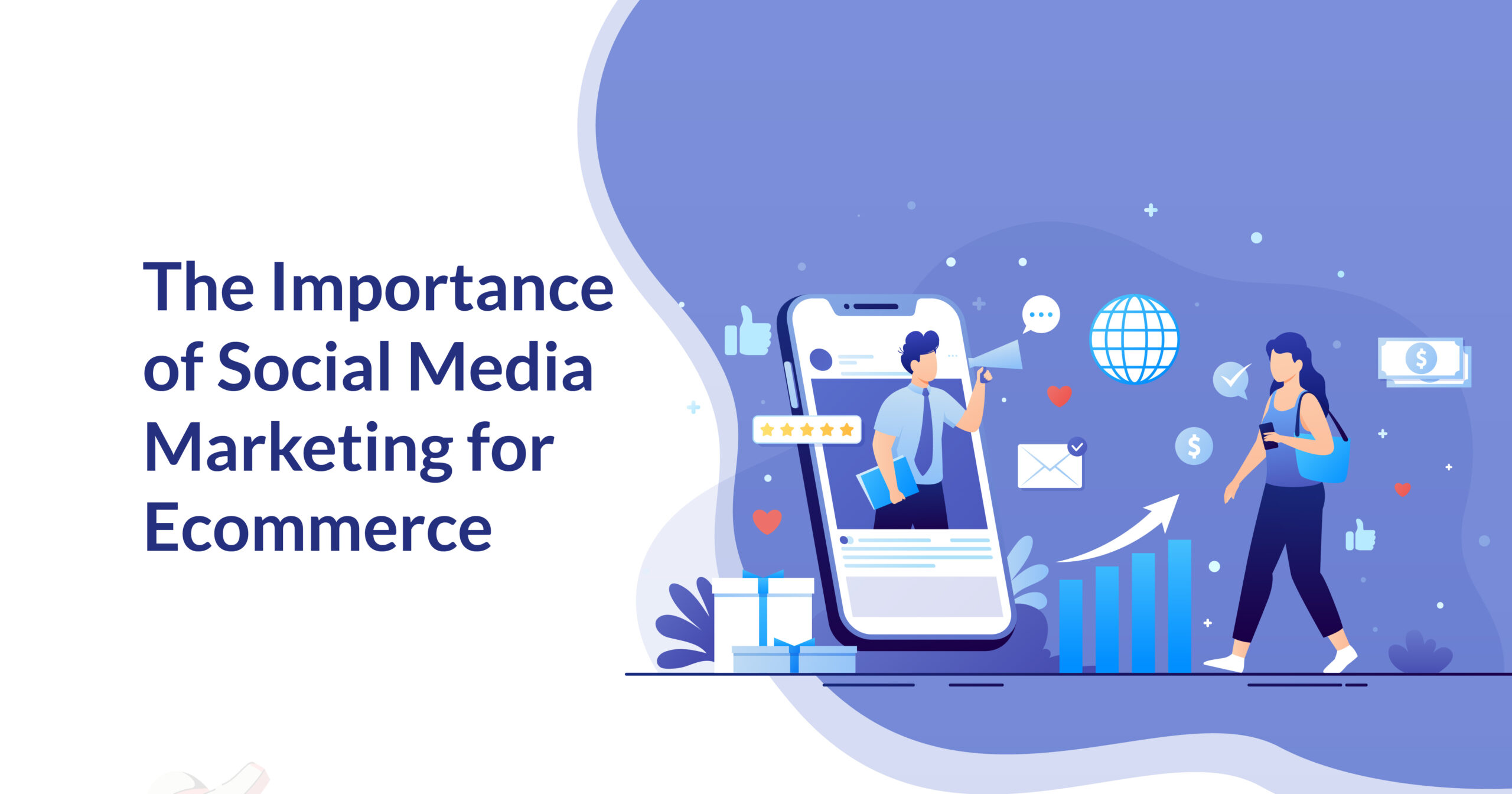In the digital era, social media marketing has emerged as a transformative force in modern marketing strategies. Defined as the utilization of social media platforms to promote products and services, it has grown hand-in-hand with the explosive expansion of ecommerce. With the ever-increasing number of social media users and its global reach, businesses now recognize the pivotal role social media plays in establishing brand awareness, driving customer engagement, and fostering loyalty. This introduction highlights the inseparable relationship between social media marketing and ecommerce, underscoring the paramount importance of harnessing this powerful tool for business success.
The Power of Social Media for Ecommerce
A. Reach and audience size
Social media for ecommerce wields immense power due to its unparalleled reach and vast audience size. With billions of active social media users worldwide, businesses can tap into a vast and diverse customer base. The statistics on the sheer number of users attest to the enormous potential for brands to engage with audiences on a global scale, making it a pivotal platform for driving sales and brand exposure.
B. Targeted advertising and audience segmentation
Social media’s targeted advertising and audience segmentation capabilities make it a game-changer for ecommerce. By leveraging user data, businesses can craft personalized marketing strategies, delivering relevant content to potential customers. Social media platforms provide sophisticated tools to precisely target audiences based on demographics, interests, behaviors, and more, ensuring that promotional efforts reach the right people at the right time. This highly tailored approach enhances conversion rates and maximizes return on investment, making social media an indispensable asset for ecommerce success.
C. Building brand awareness and loyalty
Social media plays a pivotal role in building brand awareness and fostering loyalty for ecommerce businesses. By showcasing products and services to a wide audience, brands can create a strong online presence and reach potential customers globally. Moreover, by cultivating brand advocates and influencers on social media, businesses can harness the power of word-of-mouth marketing, as these influencers can advocate for the brand and its offerings, leading to increased credibility and customer trust. This organic and authentic approach helps in establishing long-term relationships with customers, resulting in higher customer retention and brand loyalty.
Social Media Platforms for Ecommerce Marketing
A. Facebook
Facebook is a prominent social media platform for ecommerce marketing, offering robust advertising features. With its extensive user base, businesses can target specific demographics and interests, maximizing the reach of their marketing campaigns. Ecommerce brands have witnessed remarkable success on Facebook, as it allows them to showcase products, drive traffic to their websites, and increase sales. Through compelling visuals, engaging content, and strategic ad placement, businesses can tap into Facebook’s vast potential to connect with their target audience and achieve significant business growth.
B. Instagram
Instagram, a highly visual platform, offers immense potential for driving sales in ecommerce. Brands can leverage captivating visual content to showcase products and engage with their audience, increasing the likelihood of conversion. Moreover, with Instagram shopping and product tags, businesses can seamlessly link their products to their online stores, streamlining the purchase process for customers. As for Twitter, it enables real-time marketing opportunities and targeted advertising, allowing ecommerce brands to reach specific demographics and engage in timely interactions with potential customers. Both platforms present unique advantages for ecommerce businesses seeking to expand their online presence and boost sales.
D. Pinterest
Pinterest serves as an exceptional platform for ecommerce by allowing businesses to showcase products creatively through inspirational boards. Brands can curate visually appealing collections that resonate with their target audience, sparking interest and aspiration. Leveraging Pinterest’s product discovery potential, businesses can tap into users’ intent to explore and discover new items, driving traffic and potential sales to their websites. With its focus on visuals and product discovery, Pinterest offers ecommerce brands a unique opportunity to inspire and engage customers, making it an invaluable addition to their marketing strategy.
Social Media Content Strategies for Ecommerce
A. Creating engaging content
In the realm of social media content strategies for ecommerce, creating engaging content is key to success. Ecommerce businesses can employ a mix of compelling images, videos, and interactive content to capture the attention of their target audience and foster meaningful interactions. Additionally, incorporating storytelling and emotional appeal in marketing helps forge stronger connections with customers. Creating a sense of authenticity and trust. By crafting captivating content that resonates with users, ecommerce brands can drive higher levels of engagement, enhance brand loyalty, and ultimately boost sales and conversions.
B. User-generated content and social proof
User-generated content (UGC) and social proof play a crucial role in ecommerce marketing. By encouraging customers to share their experiences with products and services, businesses can harness the power of authentic UGC to build trust and credibility. Additionally, leveraging customer reviews and testimonials on social media helps prospective buyers gain valuable insights. Leading to increased confidence in their purchase decisions. Incorporating UGC and social proof into marketing strategies not only fosters a sense of community around the brand but also drives higher engagement and conversion rates, making it an indispensable approach for ecommerce success.
C. Social media contests and promotions
Social media contests and promotions are potent tools for ecommerce businesses. By offering giveaways and discounts, brands entice customers to participate, driving increased engagement and customer acquisition. Moreover, these contests encourage social sharing among participants, exponentially expanding the brand’s reach and visibility. The viral nature of such campaigns can lead to a surge in followers, likes, and shares, amplifying the brand’s message and attracting potential customers. As a cost-effective and interactive marketing tactic, social media contests and promotions present a valuable opportunity for ecommerce businesses to create buzz around their products and foster brand loyalty.
Metrics and Analytics for Social Media Marketing
A. Identifying relevant metrics for ecommerce success
Metrics and analytics are vital components of social media marketing for ecommerce success. Identifying relevant metrics such as conversion rate, click-through rate, and engagement allows businesses to gauge the effectiveness of their campaigns and optimize their strategies accordingly. Moreover, measuring return on investment (ROI) from social media efforts helps in assessing the financial impact of marketing initiatives. Guiding resource allocation and decision-making. By closely monitoring these key performance indicators, ecommerce brands can make data-driven improvements, enhancing their online presence, and driving better results in terms of sales, brand awareness, and customer engagement.
B. Utilizing social media analytics tools
Leveraging social media analytics tools is crucial for effective social media marketing. These platforms, including Google Analytics, Facebook Insights, and Twitter Analytics. Provide valuable data on audience behavior, content performance, and campaign success. By analyzing this information, businesses can gain insights into their audience’s preferences and interests, enabling data-driven decisions for content creation, targeting, and engagement strategies. Interpreting the data from these analytics tools empowers ecommerce brands to optimize their social media efforts. Refine their marketing approach, and achieve better outcomes, ultimately leading to increased brand visibility, higher conversions, and improved overall business performance.
Social Media Advertising for Ecommerce
A. Paid advertising options on social media platforms
Social media advertising is a powerful tool for ecommerce growth. It offers various paid advertising options on platforms like Facebook Ads, Instagram Ads, Twitter Ads, and more. Each platform provides distinct ad formats, such as carousel ads, video ads, and sponsored posts, tailored to meet different marketing objectives. Ecommerce businesses can leverage these diverse formats to showcase products, highlight promotions, and drive traffic to their websites. The targeted nature of social media ads allows businesses to reach their ideal customers. Optimizing ad spend and achieving higher conversion rates, making social media advertising an indispensable component of successful ecommerce marketing strategies.
B. Budgeting and bidding strategies
Budgeting and bidding strategies are critical aspects of successful social media advertising for ecommerce. Determining an appropriate advertising budget involves considering factors like campaign objectives, target audience size, and platform costs. By understanding different bidding methods, such as cost-per-click (CPC) or cost-per-impression (CPM), businesses can optimize their return on investment (ROI). Allocate their budget wisely to maximize ad performance. Effective budgeting and bidding strategies help ecommerce brands achieve higher visibility, engagement, and conversions, ensuring that their social media advertising efforts yield the best possible results within their financial constraints.
Social Media Influencer Marketing for Ecommerce
Social media influencer marketing has surged in popularity within ecommerce. Recognizing its potential to reach engaged audiences, businesses are increasingly turning to influencers to promote their products and services.
Identifying and partnering with relevant influencers is a crucial step, ensuring that their niche and following align with the brand’s target audience.
By leveraging influencers’ credibility and reach, ecommerce brands can tap into new customer segments, enhance brand awareness, and foster genuine connections with consumers. Making influencer marketing a powerful strategy to drive growth and success in the competitive online marketplace.
Identifying and partnering with relevant influencers
When engaging in influencer marketing for ecommerce, it’s crucial to identify and collaborate with the right influencers. The choice between micro-influencers, with niche audiences, or macro-influencers, with broader reach, impacts campaign success. Negotiating clear terms and agreements with influencers ensures mutual understanding and expectations. Measuring the effectiveness of influencer marketing campaigns involves tracking key metrics such as engagement, conversions, and brand mentions, allowing businesses to gauge the impact and return on investment.
Handling Customer Service on Social Media
Handling customer service on social media is paramount for ecommerce success. Being responsive and proactive is crucial to address customer queries and complaints promptly, ensuring a positive brand perception. Swiftly turning negative feedback into positive experiences through empathetic and personalized responses demonstrates commitment to customer satisfaction and fosters loyalty. By providing top-notch customer service on social media, ecommerce brands can build strong relationships. Strengthen their reputation, and create brand advocates who drive organic growth through positive word-of-mouth.
Social Media Trends in Ecommerce
Social media trends in ecommerce are shaping the way businesses engage with customers. Emerging trends in social media marketing include personalized and interactive content, influencer partnerships, and social listening for better customer insights. Integrating social commerce and buy buttons enables a seamless shopping experience within social platforms, streamlining the path to purchase. Additionally, ecommerce brands are leveraging augmented reality (AR) and virtual reality (VR) technologies to offer immersive product experiences, allowing customers to visualize products before buying. By staying ahead of these trends, businesses can remain competitive. Enhance customer engagement, and drive conversions in the dynamic landscape of social media marketing.
Conclusion
In conclusion, social media marketing is paramount for ecommerce success. Its significance lies in its reach, targeted advertising, and brand-building potential. Businesses are encouraged to adapt and optimize their social media strategies to stay competitive in the digital landscape. Continuous monitoring, analysis, and innovation are essential to refine marketing efforts and drive better results. Embracing the power of social media, ecommerce brands can expand their online presence, foster customer engagement, and ultimately boost sales, achieving long-term success in the ever-evolving world of digital commerce.




